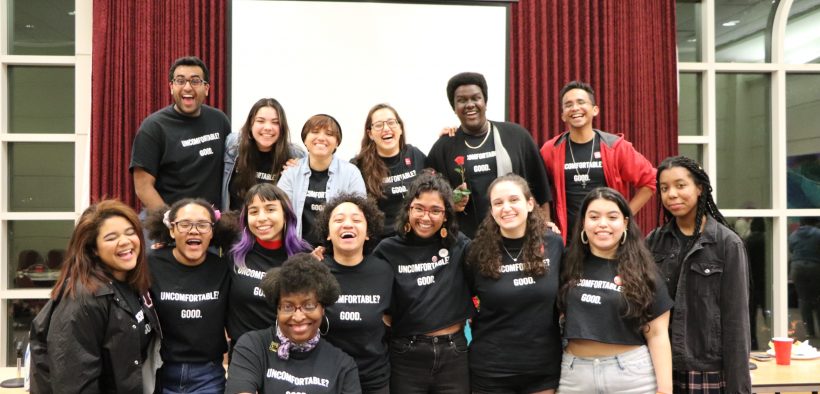The More You Know About Racism Panel: Getting Out of Our Comfort Zones
Share

“Uncomfortable? Good.”
That was the slogan of “The More You Know About Racism” panel on January 21 at 7:30 in the evening for Dream Week in honor of Dr. Martin Luther King, Jr. The event was put together by organizations under the Coalition for Diversity and Social Justice (CDSJ) umbrella. These organizations include Empowering Blacks And Others To Never Yield (EBONY), Jolt, an organization that facilitates voter registration and aims to increase the political participation of the Latinx community, the Reproductive Justice Alliance (RJA), Muslims and Allies (MAA), Kappa Delta Chi Sorority (KDChi), and Hispanic and Latinx Organization (HALO).
Additionally, the panel was supported by Terri Johnson, advisor to the CDSJ organizations, and the office of Student Activities, which sponsored door prizes, T-shirts, and food. The moderator of the panel and one of the organizers of the event, Alex Bell, noted that there were only two student organizations able to share funding: EBONY and Jolt.
“Unfortunately, the other organizations were in positions of not having any spare funding to contribute because all of the CDSJ organizations tend to receive very little funding from Southwestern,” said Bell.
Ten diverse panelists gathered in the McCombs Ballroom in front of a crowd of over 85 people to discuss issues of race, equity, and inclusion. The panelists included sophomore Ivan Maina, who is the EBONY co-president, junior Tayvin Otti, the co-president for Asian Students Association and the vice president of EBONY, sophomores Julia Mendoza and Aly Cerda from KDChi and EBONY, sophomore Aydan Urias, the co-president of RJA, first-year Bilal Kahn, the co-president of MAA and co vice-president for CDSJ [1], junior Camila Ramirez, an officer with CDSJ, junior Corrine Ramirez with KDChi and CDSJ, junior Angel Cantu from HALO, and junior Sofia Espinosa with Jolt.
The discussion was skillfully moderated by Bell who opened the evening with a poignant quote from indigenous activist Lilla Watson. “If you have come to help me, you are wasting your time. [2] If you have come because your liberation is bound up with mine, then let us work together.”
Bell deemed the event not only a safe space, but also a brave one [3]—a space in which identities would be affirmed and acknowledged, assumptions would be challenged, and difficult conversations would be had with sensitivity and nuance.
After food was served and door prizes drawn, the student panel took audience questions for the better part of two hours, and the real conversation began.
Topics ranged from how to combat casual racism from faculty members to how to be a better ally to communities of color on campus. Students on the panel voiced their concerns about being seen and valued for more than just the numbers they represent at a predominantly white institution. Many wondered about the truth behind Southwestern’s reputation as a diverse school.
“I feel like they lied to us. You have to really work to find people like you,” said Camila Ramirez.
Such a statement may resonate with many students of color, who find themselves in classes that look very different from the brochures given to them on tours. Both classmates and faculty may not look like them at all, and thus, incoming students must reconcile the story they were sold with the reality they are living. To further complicate an already fraught situation, many of the Southwestern staff—particularly food service and maintenance workers—are in fact people of color. This raises many questions about in what capacity the university is willing to collaborate with people of color; we see them far less in positions of power than we do in subservient—albeit incredibly valuable—roles.
The conversation moved next to safe spaces on campus, where the panelists seemed to reach a consensus that safe spaces couldn’t be found—they could only be made in private. When asked where people of color could be truly safe to express themselves on campus, Maina responded succinctly, “Behind closed doors.” It was an opinion that his fellow students shared.
“I don’t hate white people, I hate whiteness and the uncomfortable, hostile, and unwelcoming environment that it can cultivate for people of color,” said Bell.
The problem, then, is not white students, but rather the constructs of white privilege that can make students of color feel unsafe and out of place among their peers.
As the evening drew to a close, the panelists spoke about what allies can do to support communities of color on campus. Suggestions included amplifying voices of color rather than speaking over them, making time for coalition building, and above all, taking the time to listen.
Maina emphasized the value of fostering an ongoing commitment to equity and inclusion.
“The work doesn’t have an endpoint,” he said. “It’s a journey, not a box to check off.”
And on the topic of allyship, Bell wanted to emphasize the importance of showing up. The event was well-attended, but it is certainly worth noting that the people who probably most needed to hear the wisdom shared that evening were not in the room.
When asked for comment after the panel, Bell said, “I cannot stress enough that in order to change our campus climate into one that is more welcoming and uplifting of people of color, everyone needs to be a part of these conversations.”
Nonetheless, the panel was an enjoyable—and more importantly, valuable—beginning to what will hopefully become a continuing series of conversations about how to support students of color and do the work that it takes to make them feel as though they belong and truly have a place at Southwestern.
[1][2][3] An updated version of this article was published on Feb. 10, 2020 with corrections.
